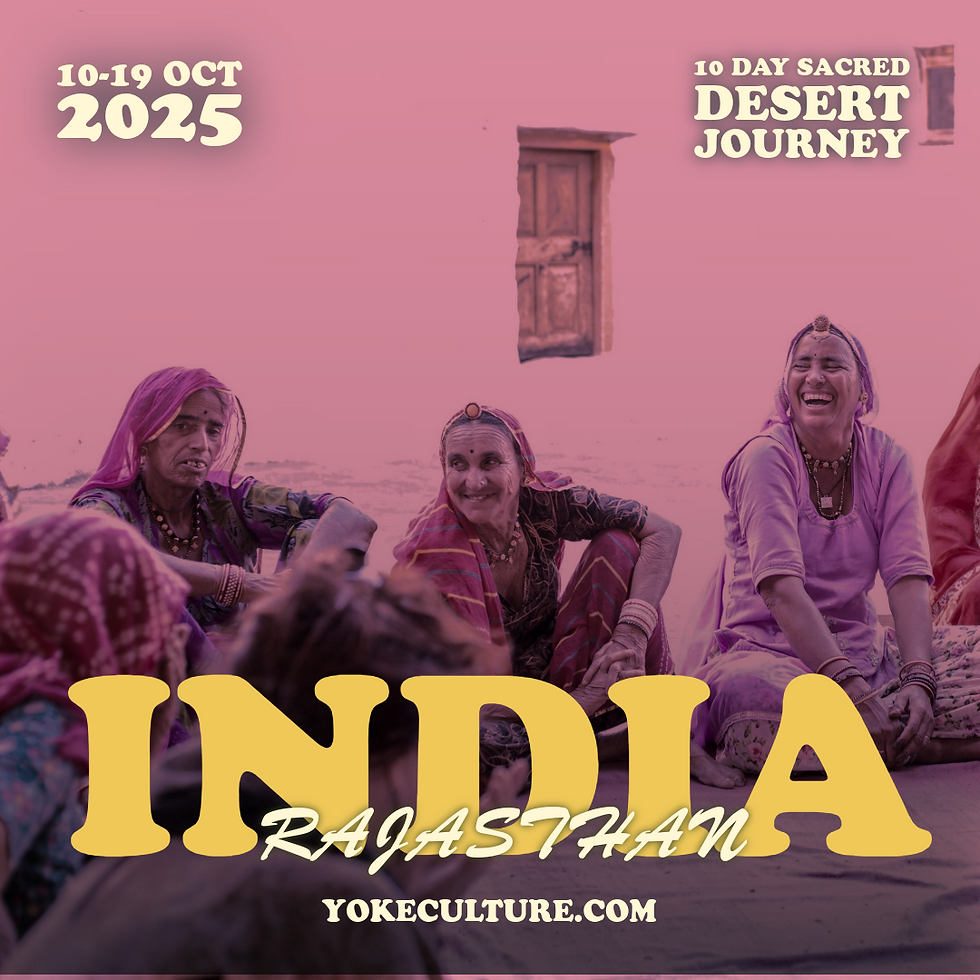Sacred Feminine in Motion: Shreejan Sita on Ritual, Ecology, and Empowerment
- Aug 28, 2025
- 3 min read
Updated: Aug 29, 2025
In the desert light of Rajasthan, where the wind carries the history of empires and the silence of sacred spaces, Shreejan Sita has been quietly reweaving the threads of feminine power, ecology, and yogic healing. We spoke with Shreejan about her journey from a farmhouse in rural obscurity to the heart of a Hindu community steeped in the teachings of the Jasnath sect—a path that has led her to become a Shakti activist, a yoga therapist, and a guide for girls discovering their own gifts in a world still shaped by patriarchy.
Her story is as much about personal transformation as it is about collective awakening. Between reflections on childhood meditations in the trees, lessons in grace, and the enduring work of planting both seeds and ideas, Shreejan’s words carry a profound invitation: to witness the power of women, of nature, and of sound to heal, guide, and transform.
Here, in conversation, she shares her journey, her philosophy, and the practices that inform this unique Goddess Fest of Utsava Maa.

Could you share a bit about your early life?
Shreejan Sita: I grew up on a farmhouse in the middle of nowhere, surrounded by cornfields, wheat fields, and forests. My mother taught me to find healing in the trees. Epilepsy was part of my childhood, and she didn’t have the answers—but she knew the trees did. Watching her care for the land, I learned meditation without words, just by witnessing presence and attention. Later, I explored many religious traditions—from Catholic catechism to Methodist college, and eventually Jewish life with my family. Through it all, the common thread was recognising the divine in nature and the importance of individual experience over doctrine.
How did your path lead you to India and the Jasnath community?
SS: After losing my publishing job in New York, I came on a yoga tour of India. At the final ashram we visited, I met Guru-ji. His way of living—entirely free from capitalism, aggression, or ego-driven goals—was unlike anything I’d ever encountered. Here, I regained faith in humanity. I began working with girls’ camps, sound therapy, and ecological projects, inspired by his teachings and the ancient wisdom of the Marwar Valley.
You’ve created programs for girls that are deeply connected to Shakti and empowerment. How did you approach that work?
SS: Initially, I was nervous about designing a curriculum for a culture that wasn’t my own. Guru-ji told me, “Just throw the ball.” I realized it wasn’t about instructing but demonstrating another way to live—through presence, play, and role modelling. The girls learned teamwork, confidence, and agency by simply observing and participating. This is Shakti in action: reclaiming space, discovering gifts, and exercising choice.
Sustainability is a recurring theme in your work. How do you define a sustainable activist?
SS: I see sustainability in results. How many girls attend school? How many trees have we planted? How are communities transforming? Spiritually, it’s seeing impact ripple outward. Financially, it’s less important. Like Jasnath, I focus on planting seeds—literal and metaphorical—and trust that Dharma will take root.
Grace is central to your teaching. How do you embody that concept in your work?
SS: Change must happen gracefully, or it becomes conflict. Grace is about moving through the world with patience, respect, and support—even when decisions frustrate us. It’s teamwork in life: protecting each other’s growth, honouring agency, and facilitating transformation without force. In both domestic life and global activism, grace allows progress without harm.
Finally, what does the future hold for the Utsava Maa Festival and your activism?
SS: We continue to nurture Shakti through education, ecological work, and sound therapy. By cultivating awareness, supporting girls’ autonomy, and reconnecting people to nature, we aim for a shift that is both profound and enduring. The festival is a celebration of this work—a meeting point for divine feminine energy, community, and wisdom that transcends borders.
It’s all about planting the right seeds and trusting the process.
Shreejan Sita is a veteran Yoga Therapist and Ayurveda Practitioner trained in India. Having healed herself from epilepsy through meditation, she specializes in neurological and holistic therapies. She founded the Shridevi Wellness Center at Shri Jasnath Ashram in Rajasthan, serving communities across the Thar Desert. With 30+ years’ experience teaching Ayurveda and Yoga Therapy globally, her upcoming book, Yogecology: Spirit in the Soil (2025), explores the return to Nature Therapy and has been endorsed by the government of India.






